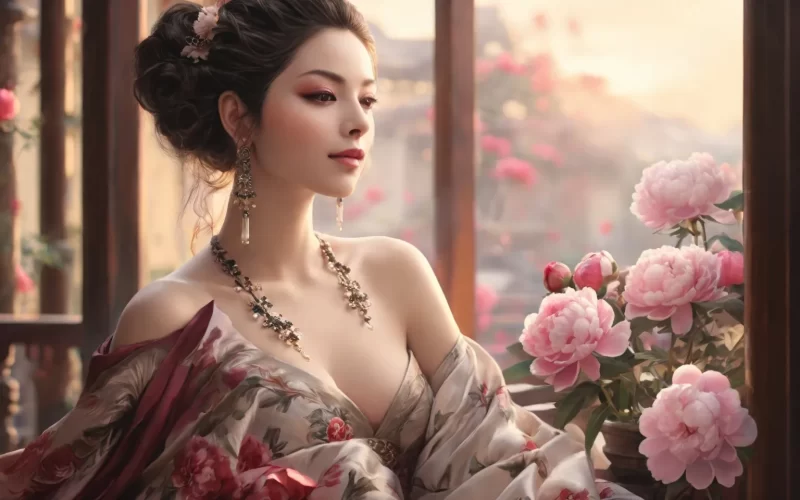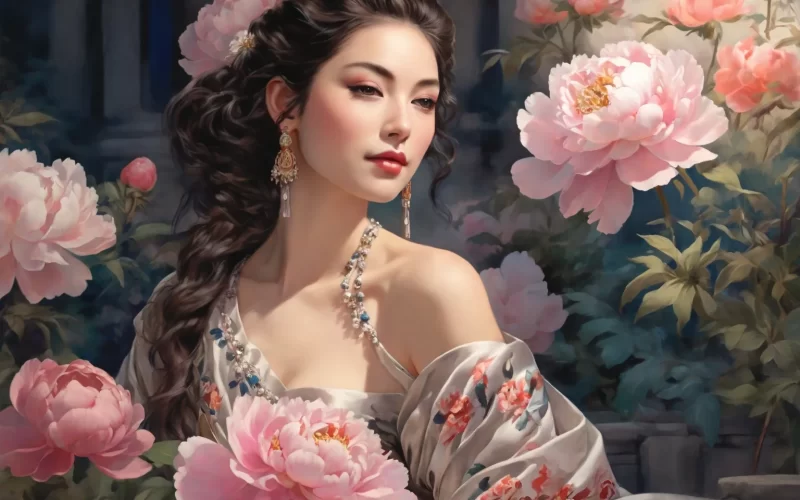There's a perfume stealing moist from a shaft of red blossom,
And a mist, through the heart, from the magical Hill of Wu -
The palaces of China have never known such beauty -
Not even Flying Swallow with all her glittering garments.
Original Poem
「清平调 · 其二」
李白
一枝红艳露凝香,云雨巫山枉断肠。
借问汉宫谁得似?可怜飞燕倚新妆。
Interpretation
This poem centers on the beauty and favor of Yang Guifei, using imagery such as flowers, the goddess, and the ancient beauty Zhao Feiyan to layer upon layer highlight her unparalleled elegance and supreme status. Emperor Xuanzong of Tang doted on Yang Guifei excessively, and the poet uses this to express her glory of "gathering the favor of three thousand in one person," while also subtly implying a critique of the emperor's excessive favoritism.
First Couplet: “一枝红艳露凝香,云雨巫山枉断肠。”
Yī zhī hóng yàn lù níng xiāng, yún yǔ Wū Shān wǎng duàn cháng.
A single branch of red, radiant and fragrant with dew; the goddess of Mount Wu, shrouded in clouds and rain, only brings futile heartbreak.
The poet uses a peony adorned with dewdrops as a metaphor for Yang Guifei, symbolizing her receiving the emperor's utmost favor and hinting at her flower-like delicacy and beauty. "Clouds and rain over Mount Wu" alludes to the Gaotang Fu, where the King of Chu dreams of the goddess of Mount Wu. Here, the poet uses this mythological reference to contrast Yang Guifei's supreme favor—while the goddess is merely a dream, Yang Guifei is a real-life favored consort, making even the goddess's legend pale in comparison.
Second Couplet: “借问汉宫谁得似?可怜飞燕倚新妆。”
Jiè wèn Hàn gōng shuí dé sì? Kě lián Fēi Yàn yǐ xīn zhuāng.
Who in the Han palace could compare? Pitiful Zhao Feiyan, who relied on new makeup.
The poet continues the comparison, elevating Yang Guifei above historical beauties. Although Zhao Feiyan was a favored consort of Emperor Cheng of Han, she needed elaborate makeup to enhance her beauty, while Yang Guifei was naturally stunning, requiring no adornment to captivate the nation. This further emphasizes her unparalleled beauty.
Overall Appreciation
The poem employs a progressive series of comparisons, moving from the opulent beauty of the peony to the dreamlike allure of the goddess of Mount Wu, and finally to the artificial beauty of Zhao Feiyan, ultimately highlighting Yang Guifei's unique elegance. The poem blends realistic description with mythological and historical allusions, making Yang Guifei's image even more vivid. She is not only incomparably beautiful but also unprecedentedly favored, surpassing even mythical goddesses and historical beauties.
Writing Characteristics
- Use of Metaphor to Enhance Imagery: The peony symbolizes Yang Guifei's grace and nobility, while the allusion to the goddess of Mount Wu reinforces her supreme favor.
- Progressive Layering to Highlight the Theme: From the flower to the goddess, and then to the historical beauty, each layer builds up Yang Guifei's uniqueness, elevating her beauty and favor to the pinnacle.
- Contrast to Enhance Praise for Yang Guifei: Zhao Feiyan needed makeup, while Yang Guifei was naturally beautiful, underscoring her incomparable allure.
- Concise Language and Elegant Imagery: The lines are refined and flowing, poetic yet profound, showcasing Yang Guifei's extraordinary elegance.
Insights
On the surface, this poem praises Yang Guifei's beauty and favor, but it also subtly hints at the impermanence of worldly things. Beauty fades, and favor is fleeting; even though Yang Guifei outshone all others, she could not escape the changes of fate. This invites reflection on the nature of true beauty and favor—perhaps they lie not in outward appearance or favoritism but in inner grace and spiritual richness.
Poem translator
Kiang Kanghu
About the poet

Li Bai (李白), 701 - 762 A.D., whose ancestral home was in Gansu, was preceded by Li Guang, a general of the Han Dynasty. Tang poetry is one of the brightest constellations in the history of Chinese literature, and one of the brightest stars is Li Bai.











